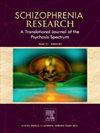The pleasure expectancies scale (PLEX): A brief measure of expectancies for pleasure in schizophrenia
IF 3.6
2区 医学
Q1 PSYCHIATRY
引用次数: 0
Abstract
A critical dysfunctional belief system implicated within the cognitive model of negative symptoms is low expectancies for pleasure, which refers to unhelpful beliefs characterized by generally negative expectations for one's likelihood of experiencing pleasure. In light of concerns regarding existing measures of anticipatory pleasure, the current study sought to examine the reliability and validity of a new brief self-report questionnaire, titled the Pleasure Expectancies Scale (PLEX). One hundred twenty five individuals with a diagnosis of schizophrenia-spectrum disorder (SSD) were administered the 8-item PLEX, along with a battery of other clinical and cognitive measures. The psychometric properties of the PLEX were evaluated. Cronbach's alpha was acceptable at baseline (α = 0.741) and good at the 6-month follow-up (α = 0.815, n = 75). Correlational analyses demonstrated good convergent and discriminant validity, as well as test-retest reliability at 6 months. Construct validity, as it pertains to the cognitive model of negative symptoms, was also established by way of significant correlations with negative symptoms, diminished motivation, and defeatist performance beliefs. Hierarchical regressions also revealed that the PLEX accounted for greater variance in negative symptoms beyond that of existing measures of anticipatory pleasure. Our findings suggest that the PLEX is a promising new measure of expectancies for pleasure in individuals with SSDs, with good indicators of reliability and validity. The PLEX lends itself well to both research and clinical settings, which may be particularly important given the hypothesized role of dysfunctional beliefs as mechanistic targets for treating negative symptoms using psychosocial interventions.
快乐期望量表(PLEX):对精神分裂症患者的快乐期望的简短测量
在消极症状的认知模型中,一个关键的功能失调的信念系统是对快乐的低期望,这是指以对一个人体验快乐的可能性的普遍消极期望为特征的无益信念。鉴于对预期快乐的现有测量方法的关注,目前的研究试图检验一种新的简短的自我报告问卷的可靠性和有效性,名为快乐期望量表(PLEX)。125名被诊断为精神分裂症谱系障碍(SSD)的患者接受了8项PLEX测试,并进行了一系列其他临床和认知测试。评估了PLEX的心理测量特性。Cronbach's alpha在基线时可接受(α = 0.741),在6个月随访时良好(α = 0.815, n = 75)。相关分析显示出良好的收敛效度和判别效度,以及6个月时的重测信度。建构效度与消极症状的认知模型相关,也与消极症状、动机减弱和失败主义行为信念显著相关。层次回归还显示,PLEX在负面症状上的差异比现有的预期快乐测量方法更大。我们的研究结果表明,PLEX是一种很有希望的测量ssd个体快乐期望的新方法,具有良好的可靠性和有效性指标。PLEX很适合研究和临床设置,考虑到功能失调信念作为使用社会心理干预治疗阴性症状的机制目标的假设作用,这可能特别重要。
本文章由计算机程序翻译,如有差异,请以英文原文为准。
求助全文
约1分钟内获得全文
求助全文
来源期刊

Schizophrenia Research
医学-精神病学
CiteScore
7.50
自引率
8.90%
发文量
429
审稿时长
10.2 weeks
期刊介绍:
As official journal of the Schizophrenia International Research Society (SIRS) Schizophrenia Research is THE journal of choice for international researchers and clinicians to share their work with the global schizophrenia research community. More than 6000 institutes have online or print (or both) access to this journal - the largest specialist journal in the field, with the largest readership!
Schizophrenia Research''s time to first decision is as fast as 6 weeks and its publishing speed is as fast as 4 weeks until online publication (corrected proof/Article in Press) after acceptance and 14 weeks from acceptance until publication in a printed issue.
The journal publishes novel papers that really contribute to understanding the biology and treatment of schizophrenic disorders; Schizophrenia Research brings together biological, clinical and psychological research in order to stimulate the synthesis of findings from all disciplines involved in improving patient outcomes in schizophrenia.
 求助内容:
求助内容: 应助结果提醒方式:
应助结果提醒方式:


